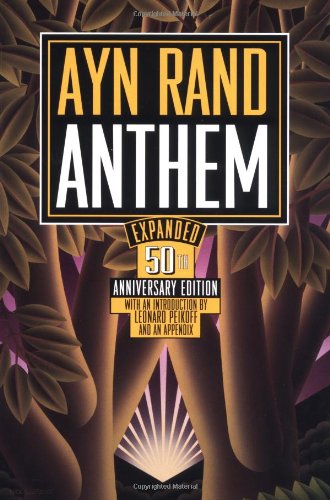Anthemism or going anthem is the vision of founding a new sovereign state based on Objectivist philosophy, with governance by laissez-faire Capitalism.

Image from Amazon
Anthem
The term “Athemism” originates from the title of Ayn Rand’s novelette Anthem. This inspiring work, written in poetic prose, is read by thousands of high school students each year through the Ayn Rand Institute’s Books for Teachers program. From the book cover:
“Anthem has long been hailed as one of Ayn Rand’s classic novels, and a clear predecessor to her later masterpieces, The Fountainhead and Atlas Shrugged. In Anthem, Rand examines a frightening future in which individuals have no name, no independence, and no values. Equality 7-2521 lives in the dark ages of the future where all decisions are made by committee, all people live in collectives, and all traces of individualism have been wiped out.”
“A new generation has discovered that Rand’s Anthem is more socially relevant today than it was when it was written seventy-five years ago. Anthem is the classic story about the consequences of social collectivism and the importance of individualism. Anthem has been described as ‘one of the most important prose poems ever written.’”
“In her usage of the English language she combines clarity of expression with prose of poetic grace. Here, indeed, is an anthem-an anthem, not in the idiom of music, but in the more difficult medium of words alone. This is the most beautiful, the most inspiring novel this reviewer has ever read. It is an ethical and philosophical rather than a religious dedication to freedom and the individual.” — Joan DeArmond, Fact Forum News
“Reading this inspired little story is a rewarding and satisfying experience which no American should deny himself.” — All-American Books

From The Founder
My name is Boris Reitman. In my twenties, I stumbled upon Atlas Shrugged after three people recommended it to me. One was a tech guy, another was a free spirited young woman who wrote poetry, and another was a sophisticated woman executive. I found it so surprising that such different types of people could like the same book, that I decided to read it out of curiosity. I finished it in a month, but it took me a few years to digest it. I thought about starting a Galt’s Gulch-like society, but there was, and still is, no technological way to hide it, as it was done in the novel.
Most American Objectivists think that the way forward is to try to change the United States for the better, by spreading ideas through books, media and private education. I don’t disagree, but in such a large country the process could take hundreds of years. I celebrate these efforts, but at a distance. I think it’s better to try to create a new country. It sounds crazy, but it is not impossible. In the last 100 years, several new countries have been created.
If you are frustrated with how things are, I invite you to get onboard with Anthemism. If we don’t take action, our children will face the same situation we are in once they reach maturity, and the cycle will repeat.
Below is a one-hour long discussion on the My Latin Life podcast, in which I introduce the idea of Anthemism.
Recent Articles
Stop Waiting for Godot
The playwright Samuel Beckett won the Nobel Prize in Literature in 1969, largely because of his play Waiting for Godot (pronounced “Goh-doh,” with a silent “t”). Its plot follows two characters, Vladimir and Estragon, who are waiting by a tree for someone named Godot, hoping he will bring meaning or purpose to their lives. They talk, pass the time with small tasks, and meet a couple of other characters with whom they have meaningless conversations. Godot never shows up.
Ayn Rand Speaks
In this concise 9-minute presentation—drawn from a 1962 recording of Ayn Rand reading her first Los Angeles Times column—the philosopher and novelist introduces the core principles of Objectivism, her philosophy grounded in reason and individualism. She outlines her views on reality, the power of human reason, the nature of man, and her vision for an ideal political system.